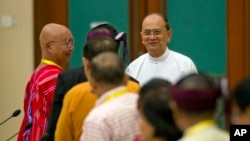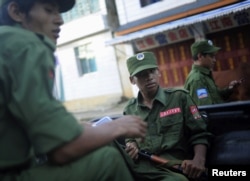Myanmar on Thursday signed a cease-fire agreement with eight armed groups, but other significant rebels fighting the government refused to sign the pact.
“The National Cease-fire Agreement is a historic gift from us to generations of the future,” declared President Thein Sein at the signing ceremony in the capital, Naypyidaw.
“Tens of thousands of troops from both sides have lost their lives in the conflicts,” the president noted. “Hundreds of thousands of people living in conflict areas have suffered severely due to the fighting.”
Acknowledging that the ethnic Kachin and Wa – with tens of thousands of soldiers – are still determined to fight, Thein Sein pledged to “try harder to gain agreement with other groups.”
About 40 percent of the population of Myanmar – also known as Burma – are members of ethnic groups, many of them with longstanding demands for control over natural resources in their territories.
The chief of the Karen National Union, Saw Mutu Say Poe, offered some advice to Myanmar's powerful military.
“We would like to request that the military use dialog rather than force” to persuade other groups to put down their weapons, he said.
The KNU is arguably the most significant signatory and has been fighting the military for 60 years. Under terms of the cease-fire – which does not require disarmament – political dialog is to commence within 90 days. It took two years of negotiations to bring the eight rebel groups on board. Those who signed on to the pact are primarily clustered along Myanmar's border with Thailand.
US reaction
The pact is “a critical first step in a long process of building a sustainable and just peace in Burma,” the U.S. State Department said in a statement.
It also expressed concerns about reports of “continued military offensives in Kachin and Shan States and the lack of humanitarian access to many of the more than 100,000 internally displaced persons in those areas.”
The ceremony, nationally televised with rebel representatives in ethnic dress, occurred just weeks before what are expected to be Myanmar's first credible national election in decades.
Opposition leader
The National League for Democracy, the party of opposition leader Aung San Suu Kyi, is expected to make significant gains in the polling, although the Nobel Peace Prize laureate is barred by the junta-drafted constitution from becoming president.
Suu Kyi did not attend Thursday's ceremony and has previously expressed skepticism about the agreement.
Earlier this week, Myanmar's national election commission briefly considered delaying next month's election, contending logistical issues because of recent serious flooding.
The NLD was the only party to raise objection, according to its officials, and the election commission announced balloting would proceed as scheduled.
The NLD secured 80 percent of the legislative seats in the 1990 election, but results were nullified by the military, which refused to hand over power and then put Suu Kyi under house arrest for years














